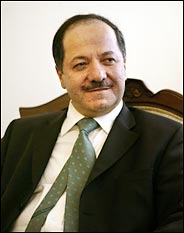 BAGHDAD, Iraq, Sept. 1 - The old Kurdish guerrilla leader is savoring his most recent victory, won not on the field of battle but in the arid drawing rooms of Baghdad's constitutional convention.
BAGHDAD, Iraq, Sept. 1 - The old Kurdish guerrilla leader is savoring his most recent victory, won not on the field of battle but in the arid drawing rooms of Baghdad's constitutional convention. "Let me tell you, politics is much more difficult than war," says Massoud Barzani, Kurdish Democratic Party leader and former warlord. In three weeks of talks here, Massoud Barzani, the former guerrilla leader, quietly secured in the new Iraqi constitution virtually everything the Kurds were asking for, enshrining powers of autonomy that approach those of a sovereign state.
"Let me tell you, politics is much more difficult than war," says Massoud Barzani, Kurdish Democratic Party leader and former warlord. In three weeks of talks here, Massoud Barzani, the former guerrilla leader, quietly secured in the new Iraqi constitution virtually everything the Kurds were asking for, enshrining powers of autonomy that approach those of a sovereign state.

